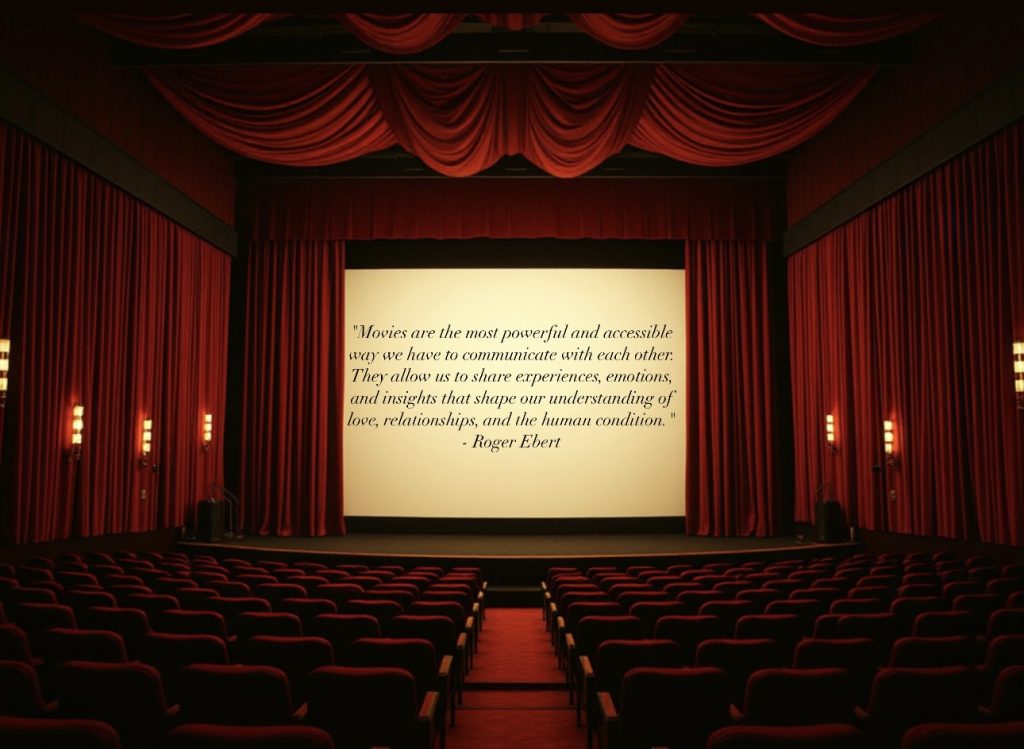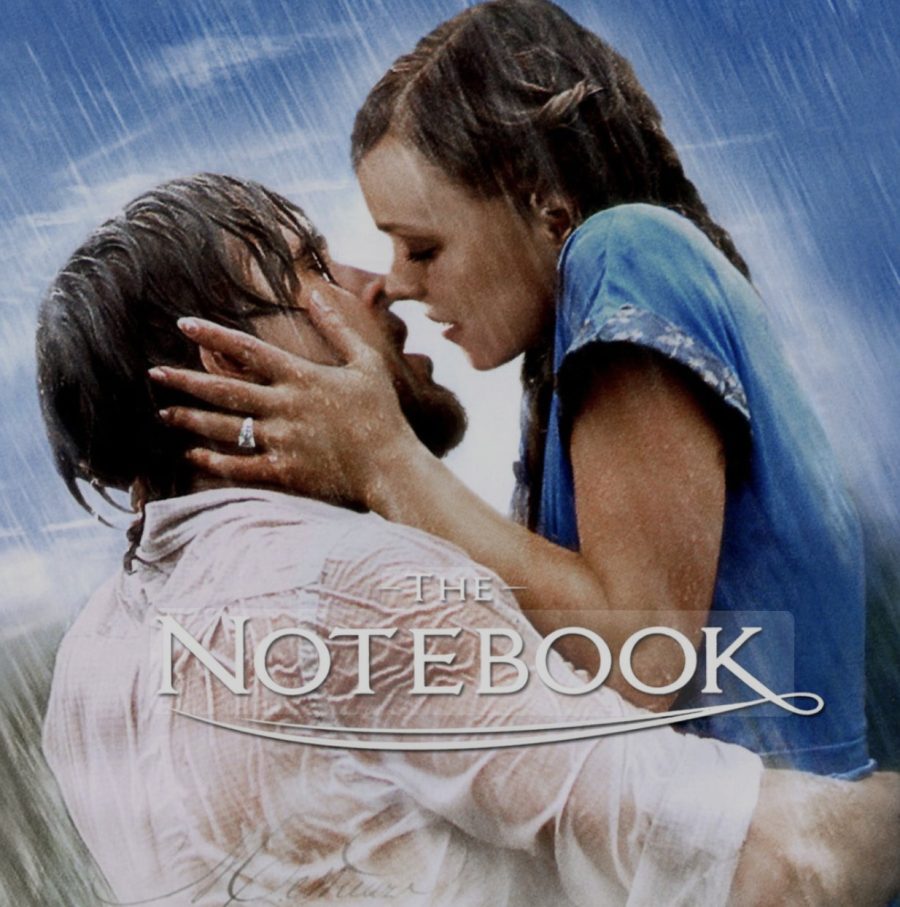How much do films shape our ideas about love and relationships? Take the timeless drama The Notebook, which narrates the story of Allie Hamilton and Noah Calhoun. The film unfolds around an elderly man who, as part of an effort to rekindle his wifeÔÇÖs fading memory due to dementia, reads to her the story of two young lovers separated by class and cultural expectations – this story is, in fact, their own. However, what if the narrative is not just about their love? What if the medium that delivers the story shapes our understanding of love itself? This is where Marshall McLuhan’s Medium Theory becomes relevant.

The Medium is the Message: Cinema as a Powerful Conduit
McLuhan’s famous phrase, “The medium is the message“, asserts that the medium delivering information, like cinema, significantly impacts society more than the content itself. McLuhan refers to movies as ‘hot media‘, which fully engage the audience with rich detail, requiring little viewer interpretation. The film provides all visual and emotional indices, making it easy for the audience to attach themselves to the characters without trying to understand them. The film captivates with immersive qualities like close-ups, slow motion, and the unforgettable rain scene that pulls viewers into Noah and Allie’s love, making it tangible. The use of seamless visuals and ingenious camera angles stir feelings and complements the experience of watching, rendering the traditional forms of media two-dimensional. Such techniques excite strong feelings within and transport one into the depth of the romantic tale (Meyrowitz, 1986).
Cinematic Romance and Societal Ideals
The Notebook exerts a broader reach than only the fulfilment of personal fantasies, for it helps mould society’s opinions about love. It tests the limits of McLuhan’s ideas by reinforcing such beliefs as love conquers all (Taylor, Ll and Harris, 2008). These tales help create a cultural narrative of love as an emotion that knows no boundaries imposed by societal structures. McLuhan emphasised that new media change how we think and act, and The Notebook delivers a powerful message: true love breaks through any social barrier. McLuhan also termed “technological determinism,” which suggests that technology, such as cinema, drives social change (Laughey, 2007). The Notebook shapes perceptions and social expectations of romance and class. Whether in cinemas or at home, the cinematic experience influences our understanding of love (Logan, 2011).

Personal Reflections on Media and Love
In retrospect, it is clear that timeless classics have shaped my views on relationships. Growing up, many idealised love as depicted in movies, leading to expectations that often clashed with reality. Through McLuhan’s theory, media can distort our perceptions of love. Today, social media platforms like Instagram and TikTok further influence our views, presenting idealised and often unrealistic portrayals of romance that affect our expectations. This reflects McLuhan’s view that the mediumÔÇô film or social media ÔÇô transforms the message, altering how we love and relationships are interpreted.
Conclusion: Beyond the Love Story
Simply put, The Notebook is more than an ordinary fictional tale of love; it exemplifies cinema’s power to shape the audience’s perception of romance and demonstrates McLuhan’s theory that the medium ultimately influences the message we receive.
Reference
Levinson, P. (2003). Digital McLuhan. [online] Routledge. Available at: www.taylorfrancis.com/books/mono/10.4324/9780203164341/digital-mcluhan-paul-levinson.
Logan, R.K.L. (2011). McLuhan Misunderstood: Setting the Record Straight. [online] Raz├│n y palabra. Available at: https://www.redalyc.org/pdf/1995/199519981031.pdf [Accessed 25 Oct. 2024]. Logan, R.K., 2011. McLuhan misunderstood: setting the record straight.
McLuhan, M. (1964). Marshall McLuhan Understanding Media The extensions of man London and New York CONTENTS. [online] Available at: https://designopendata.wordpress.com/wp-content/uploads/2014/05/understanding-media-mcluhan.pdf.
Nature, N. (2009). THE PLAYBOY INTERVIEW. [online] NextNature. Available at: https://nextnature.org/en/magazine/story/2009/the-playboy-interview-marshall-mcluhan [Accessed 28 2024].
Sharma, S. and Singh, R. (2022). Re-Understanding Media. [online] Google Books. Available at: https://books.google.co.uk/books?hl=en&lr=&id=wZ5kEAAAQBAJ&oi=fnd&pg=PT4&dq=Sharma+and+Singh [Accessed 28 Oct. 2024].
Strate, L. 2022, “Re- Understanding Media: Feminist Extensions of Marshall McLuhan”, Communication Research Trends, vol. 41, no. 3, pp. 40-43.
Taylor, P., Ll, J. and Harris (2008). CRITICAL THEORIES OF MASS MEDIA. [online] Available at: https://comunepersoal.wordpress.com/wp-content/uploads/2011/02/critical-theories-of-mass-media_-then-and-now-paul-a-taylor-jan-ll-harris.pdf [Accessed 27 Oct. 2024].


Your reflection on The Notebook through the lens of McLuhanÔÇÖs Medium Theory is insightful. Indeed, the medium of film plays a crucial role in shaping the emotional and psychological engagement of the audience with the story. As McLuhan argues, the medium itselfÔÇöcinema, in this caseÔÇöprofoundly impacts how the narrative is perceived and experienced. The way films use visual and auditory cues, like close-ups, music, and specific camera techniques, immerses the audience in the storyÔÇÖs emotional depth. This, as you rightly point out, makes the love story between Noah and Allie not just a plot point but a visceral experience. The movieÔÇÖs use of rich, sensory detail aligns with McLuhanÔÇÖs concept of ÔÇťhot media,ÔÇŁ where viewers are fully absorbed, leaving little room for interpretation. Your analysis adds depth to understanding how the medium enhances the storytelling, making The Notebook not only a love story but also an emotional experience amplified by its cinematic presentation
I like you to use this movie as an example to analyze this topic! The blog effectively links “The Notebook” with McLuhan’s ideas on how media shapes our perspectives. I agree that movies can create unrealistic expectations of love, just like today’s social media. The explanation of ‘hot media’ is very clear, which makes me think about how deeply we are influenced by the content we see. This is a thoughtful article, but I want to know if we can still choose to see these stories as inspiration rather than letting them define our reality.
I absolutely love this movie, and I love the cast even more! This movie is a great example for McluhanÔÇÖs medium theory.
Most movies seem to follow the same tropes when it comes to love stories, so of course when we watch these romcoms and see the same theme throughout all them, we believe that this what a love story is and that itÔÇÖs what everyoneÔÇÖs experience will be.
RomComs as a form of ÔÇťhot mediaÔÇŁ definitely affects how we act and our expectations for love. This was a great blog post Maria, using such an iconic and popular movie to help explain McluhanÔÇÖs theory was a great idea! It most certainly helped me better understand the theory.